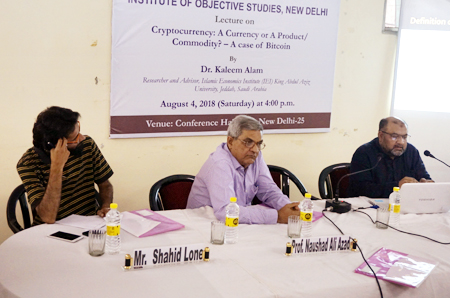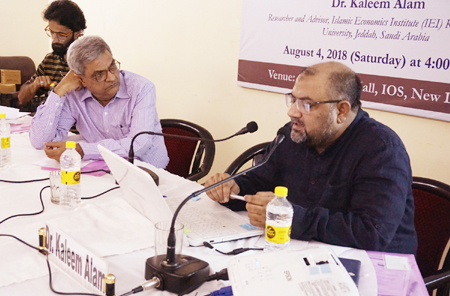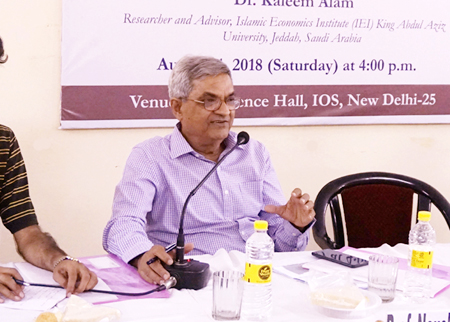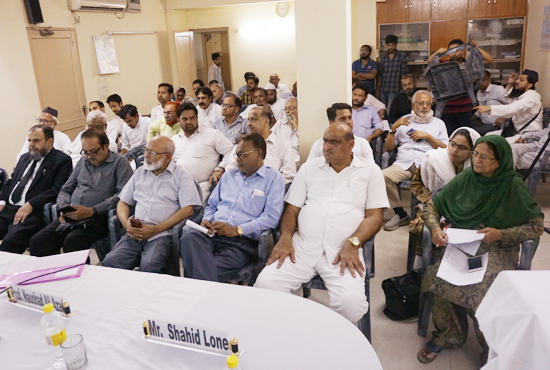IOS Lecture on "Cryptocurrency: A Currency or A Product/Commodity? - A Case of Bitcoin"
August 4, 2018 at Institute Building, 162, Jogabai, Jamia Nagar, New Delhi

The Institute of Objective Studies organised a lecture on "Cryptocurrency: A Currency or A Product/Commodity? - A Case of Bitcoin" at the Institute's conference hall on August 4, 2018. Dr. Kaleem Alam, researcher and advisor, Islamic Economics Institute (IEI), King Abdul Aziz University, Jeddah, Saudi Arabia, who delivered the lecture, described the cryptocurrency as a new evolution in money and recording of transaction, adding that this was an unchartered arena of Fin Tech.
According to the Merriam-Webster, he said, cryptocurrency is form of currency that only exists digitally, and usually has no central issuing or regulating authority. Instead it uses a decentralised system to record transactions and manages the issuance of new units, relying on cryptography to prevent counterfeiting and fraudulent transactions. Cryptography or cryptology is from Greek which means, secret.
Ronald Rivest (1990) defined cryptography as a practice and study of techniques for secure communication in the presence of third parties called adversaries. In other words, it is used for securely delivering the message to intended party or parties. The Cambridge Dictionary, he said, defined cryptocurrency as a digital currency produced by a public network, rather than any government, that uses cryptography to make sure payments are sent and received safely. The Collins Dictionary defines the term as "a decentralised digital medium of exchange which is created, regulated, and exchanged using cryptography and (usually) open source software. According to the Oxford Dictionary, he said, cryptocurrency was a digital currency in which encryption techniques are used to regulate the generation of units of currency and verify the transfer of funds, operating independently of a central bank.
He observed that all definitions by prominent dictionaries clearly hinted at the objective of cryptocurrency, which was to enable trade digitally, as cryptocurrency did not exist in hard form, but they did miss to mention the most important aspect of cryptocurrency - blockchain.

Referring to blockchain, Dr. Kaleem Alam said that whenever someone made a transaction, it was broadcast to the network to determine if the transaction was valid. If it was valid, they added it to the record of transactions, linking it to the previous transaction. This chain of linked transactions is known as the blockchain. He said that blockchain was disruptive technology, evolutionary technology, and was bound to change many of existing industries the way they functioned today.
As per Jonathan Paul Wood, blockchain is a public record of transactions. It is also distributed and thus, instead of one person controlling everything, there are thousands of computers around the world connected to a network, and these thousands of computers together come to an agreement on which transactions are valid. He said that this process was a lot more secure than a traditional database. Since many computers (in case of bitcoin, thousands) were involved in validating transactions, to hack the network one needed to break into not one computer, but thousands of computers spread throughout the world, which was harder.
Also, all of these computers keep records of the blockchain and if one wants to manipulate it, he needs to manipulate it on thousands of computers at once. Commenting on double-entry accounting, he said that today's double-entry book-keeping allowed firms to maintain records that reflected what the firm owned and owed, and also what the firm had earned and spent over any given period of time. Double-entry book-keeping revolutionised the field of financial accounting during the European Renaissance.
Elaborating on triple accounting of cryptocurrency, Dr. Alam said that it was an enhancement of the traditional double-entry system in which all accounting entries involving outside parties were cryptographically sealed by a third entry. These included purchases of inventory and supplies, sales, tax and utility payments and other expenses. Placed sides by side, the book-keeping entries of both parties to the given transaction were congruent, he observed.
Highlighting the features of triple accounting ledger, he said that it was tamper-proof record, distributed ledger, triple entry, validated, secure and private, besides having digitally signed receipts.
He noted that this technology and entries were revolutionised by bitcoin. Defining money, he said, "Money is a medium of exchange, or agreed medium of exchange. In other words, using money one can buy, sell, store it for future and agree to pay later. It can be counted and stored easily. Money has seen many innovations and patterns over centuries and millennia. He said that the first transaction of bitcoins took place in Florida, US, for the purchase of two pizzas for 10,000 BTC. Bitcoin is decentralised, digital and secure.
Cryptocurrency can be backed by assets. But, bitcoin is not backed by any asset. It is meant to facilitate purchase and sales. Commenting on the journey of money, he said that after barter, money started its journey as gold and silver in the form of coins. Then it became representative money in the form of paper money. Later, we had another major change or shock in the form of fiat money. Fiat money progressed in the electronic age in the form of electronic money and virtual money in the technology-driven era, but all representing the original fiat money that was a legal tender.
He said that bitcoin had price fluctuation and was of great interest to speculators as there was no central power to control and monopolise it. Bitcoin fitted into commodity requirements. He maintained that there were different types of cryptocurrency, besides bitcoin. There were ethereum and ripple. Bitcoin had all characteristics of money and was able to meet all of its basic functions. Thus, it was indeed a currency.
Dr. Alam opined that bitcoin and its likes could be classified as currency - cryptocurrency. Many Shariah scholars, he said, had objections to it, but some of them qualified it as a currency. Those who objected to bitcoin included Grand Mufti of Egypt, Shaykh Shawki Allam, Turkish government's religious authority, the fatwa centre of Palestine, Shaykh Haitam Alhadad and Sheikh Khaled Saifullah Rahmani. Answering the question if bitcoin was permitted from Islamic perspective, he said that it was easily used for illegal activities and was intangible. Bitcoin had no central authority that monitored its system and was a type of gambling.
He said that bitcoin was subject to high speculation because there was no base for speculation control in it and other cryptocurrencies. Besides, he said, cryptocurrency is not a legal tender. On the question if cryptocurrencies were legal, he said that the legality was dependent on how the existing authorities framed it. Some authorities forbade bringing it within their country but it was permitted to use as bribe in foreign lands. Similarly, some of the countries had made it illegal to deal with cryptocurrency within their borders, but they had no objection if one were dealing in it abroad. However, they have allowed mining bitcoin within the country.
In his view it is a permitted currency with high risk. He does not call it haram as it has nothing in it that is haram itself. He held that the world was in a transition period regarding these currencies and the use of blockchain technology. He suggested that governments should include cryptocurrency as alien (foreign) currency and it must also be included in income tax returns. Governments must also enact laws to regulate it. There was nothing illegal in it except the fear of the unknown among nations of the world, he concluded.
Prof. Eqbal Hussain, professor of law, JMI, held that the world was living in a digitised environment and since there was no regulatory body to control cryptocurrency, it could facilitate money laundering. This also raised the question of legality of transactions, he said. Prof. M Afzal Wani, Asstt. Secretary General, IOS, and professor of law, GGSI University, noted that bitcoin came up as a result of advanced technology and as such, it was not governed by law. Even the jurisdiction of this currency had not been determined by now. He said that people still continued to use the currency without knowing whether it was a game or a gamble. In finance, ethnics played a pivotal role and this posed a challenge to the state currency in the face of cryptocurrency, he observed.

In his presidential remarks, Prof. Naushad Ali Azad, former Dean, Faculty of Social Sciences, JMI, remarked that cryptocurrency was a mode of exchange and it was a legal tender because it had been authorised by several kings. But it lacked control by government. He said that bitcoin was just one of a whole range of number of cryptocurrencies. There were as many as 700 cryptocurrencies in circulation at present, and all of them could be categorised as virtual currencies. Like dollar, every currency had a market and buying and selling of this currency also continued.
He said that bitcoin was sort of a computer programming and held that common people were not using the cryptocurrency.
The chairman, IOS, Dr. M. Manzoor Alam, while lauding Dr. Alam for explaining the nitty-gritty of the bitcoin said that currency also travelled the world in phases like transportation, communication and energy. This became possible due to the entire world becoming part of digitisation. He noted that when the three phases united then a system came into being. So was the case with the bitcoin which was unstoppable. This was in line with the change that characterised the world. Borderless coin was necessary at a time when society too had become borderless. Bitcoin was such a currency, he added.

As usual, the lecture was preceded by the recitation of a Quranic verse by Hafiz Athar Husain Nadwi. The subject was introduced by Shahid Lone of the Centre of West Asian Studies, JMI, who also conducted the proceedings. The lecture was well-attended. Prominent among the attendees were Prof. Hasina Hashiya, deptt. of geography, JMI, Moin Ahmad Khan from Sahara Urdu, and H. Abdur Raqeeb and Tazeel Abdul Wahid from Indian Centre for Islamic Finance, Abdul Muneer P, a Ph.D. scholar in JMI, Dr. M A Haque, retired director, Ministry of External Affairs, Dr. S Fazle Rab, Director, IOS Patna Chapter, university teachers, research scholars, social activists and others.
|